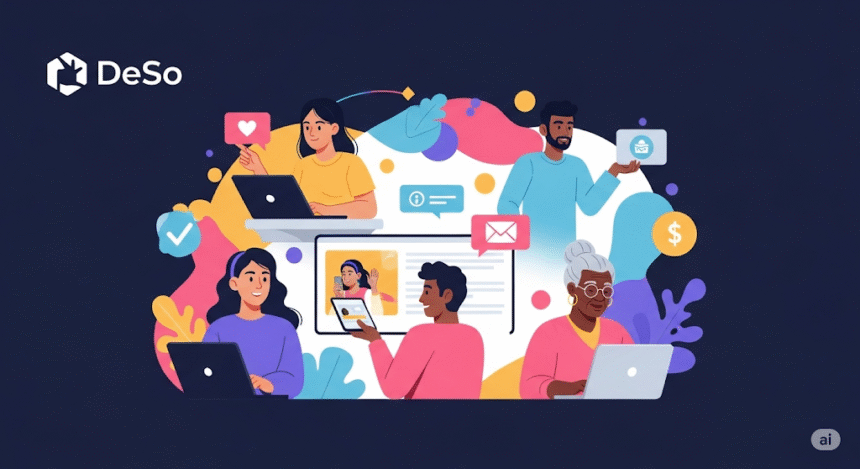For too long, the relationship between social media platforms, the creators who build on them, and the users who bring them to life has been fundamentally broken.
Creators feel like they’re on a treadmill, constantly chasing opaque algorithms just to reach the audience they built. Users feel like the product, their data harvested and their feeds filled with ads and content designed to provoke a reaction, not a connection. The platform sits in the middle, holding all the power and reaping most of the rewards.
Decentralized Social, or DeSo, is the system reboot we’ve been waiting for. It’s not just a new set of apps; it’s a fundamental restructuring of power, putting control back where it belongs: with the people who create the value.
Let’s explore the tangible ways DeSo is empowering both creators and users in 2025.
For the Creators: Building a Career, Not Just a Following
For creators, DeSo shifts the ground from rented land to owned property. This changes everything.
1. True Ownership of Your Content and Audience
In the Web2 world, your account is a liability. You build for years on a platform, and with one mistaken click of a moderator’s mouse, your account, your content, and your connection to your audience can vanish forever. Your followers are not yours; they belong to the platform.
DeSo fixes this at the core. Your identity is your crypto wallet. Your content is published on-chain. Your social graph—the list of who follows you—is a public asset you own. If a DeSo app or “client” decides to ban you or changes its rules, you can simply move to another client, taking your followers and your entire post history with you. This is true digital sovereignty.
2. Direct and Diversified Monetization
The “creator economy” in Web2 is often just the ad-revenue-sharing economy. DeSo unlocks a whole new world of direct monetization, built right into the protocol.
- Direct Tips & Micropayments: Features like “Diamonds” on the DeSo blockchain or similar mechanics on other platforms allow users to tip creators for individual posts. A ‘like’ can finally have real, tangible value attached to it.
- Creator Coins / Social Tokens: This is a game-changer. Fans can buy a creator’s unique coin, essentially “investing” in their brand. This creates a powerful, aligned incentive. As the creator’s reputation grows, their coin value can increase, rewarding their earliest and most loyal supporters.
- NFTs as Content: Any post—a piece of art, a photograph, a song, even a line of text—can be minted and sold as an NFT directly from the feed. This allows creators to capture the true value of their most resonant work.
- Gated Access & Subscriptions: Creators can easily create exclusive content or communities accessible only to holders of their specific creator coin or an NFT, creating a seamless, crypto-native subscription model.
3. Freedom from Algorithmic Tyranny
Every Web2 creator knows the pain of “praying to the algorithm.” You’re forced to create content in specific formats (Reels this month, long-form next month) just to stay visible.
On DeSo, the base layer of content is open and chronological. While individual apps will build their own algorithms on top, it becomes a competitive marketplace of algorithms. If you don’t like the feed on one app, you can switch to another that offers a different view. This frees creators to focus on what they do best: building a genuine community around authentic content, not just feeding a mysterious machine.
For the Users: Becoming a Stakeholder, Not the Product
The benefits of DeSo extend far beyond the creators. For users, it’s about reclaiming agency and having a richer, more meaningful social experience.
1. You Are the Owner, Not the Product
The foundational sin of Web2 social media is that it’s “free.” The real price is your personal data. Your clicks, interests, conversations, and location are packaged and sold to the highest bidder. You are the product.
DeSo’s architecture makes this business model obsolete. Your identity is pseudonymous and controlled by you. Because monetization happens directly between users and creators, the incentive to harvest and sell your data is dramatically reduced.
2. A Portable Identity and Reputation
On Web2, your reputation is fragmented. Your witty persona on X doesn’t help you on LinkedIn. On DeSo, your on-chain history becomes a unified, portable reputation. Your thoughtful posts, the communities you contribute to, and the creators you support all build your on-chain identity, which you can carry across any app within the ecosystem (like Lens, Farcaster, etc.).
3. A Better, More Aligned Experience
Why are Web2 feeds so often filled with ads, rage-bait, and divisive content? Because the platform’s goal is to maximize “engagement” time to sell more ads. Your well-being is not their priority.
DeSo realigns these incentives. App developers compete to provide you with the best experience because the value flows directly. This leads to innovations like the customizable feeds on Bluesky, where you, the user, decide what kind of content you want to see, breaking free from the master algorithm.
4. The Ability to Invest in What You Love
Perhaps the most profound shift for a user is moving from passive consumption to active participation. In Web2, your support is limited to a ‘like’ or a ‘follow’. In DeSo, you can become a true patron of the arts and ideas you care about.
By buying a small creator’s coin or collecting one of their early NFTs, you are providing direct support and becoming a stakeholder in their journey. Your success is tied to their success. It transforms the social graph into a true, community-owned network of value.
Final Thoughts
Empowerment is the core theme of Decentralized Social. It’s about rebalancing the scales of the internet. It takes the power that was hoarded by a few centralized platforms and redistributes it to the edges—to the millions of creators and users who build the vibrant communities we love.
This isn’t just about new features or a different business model. It’s about building a more equitable, creative, and free digital public square for everyone.
As a creator or a user, which of these benefits excites you the most? Let me know your thoughts in the comments!





